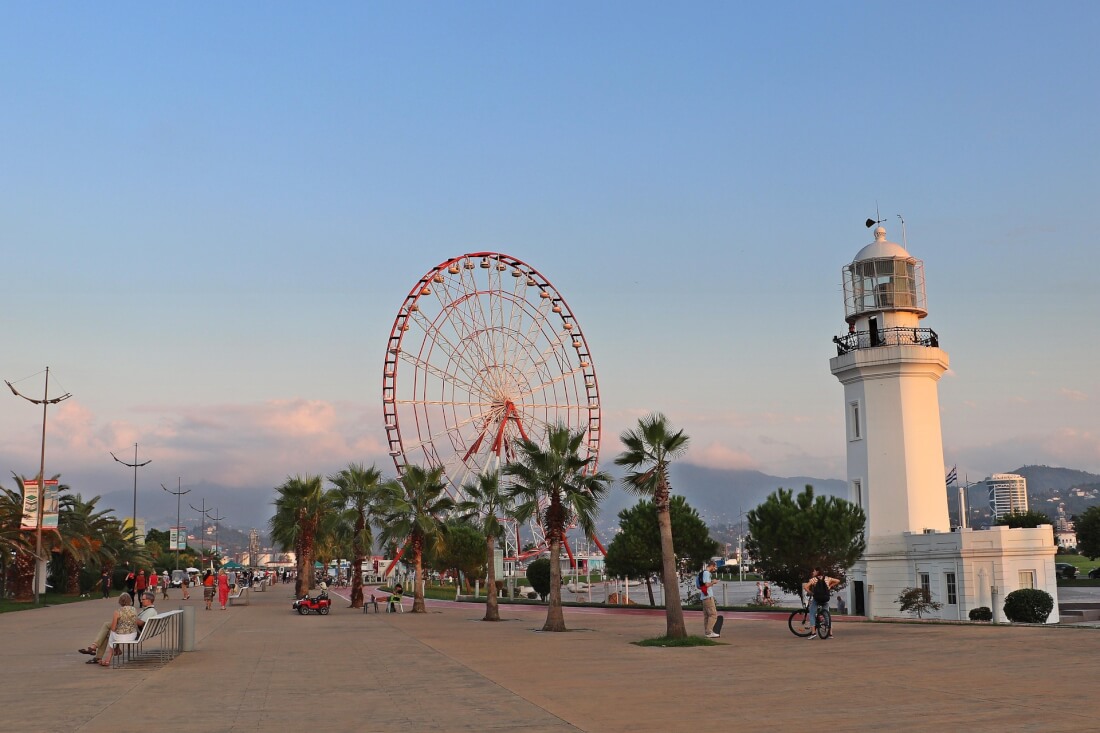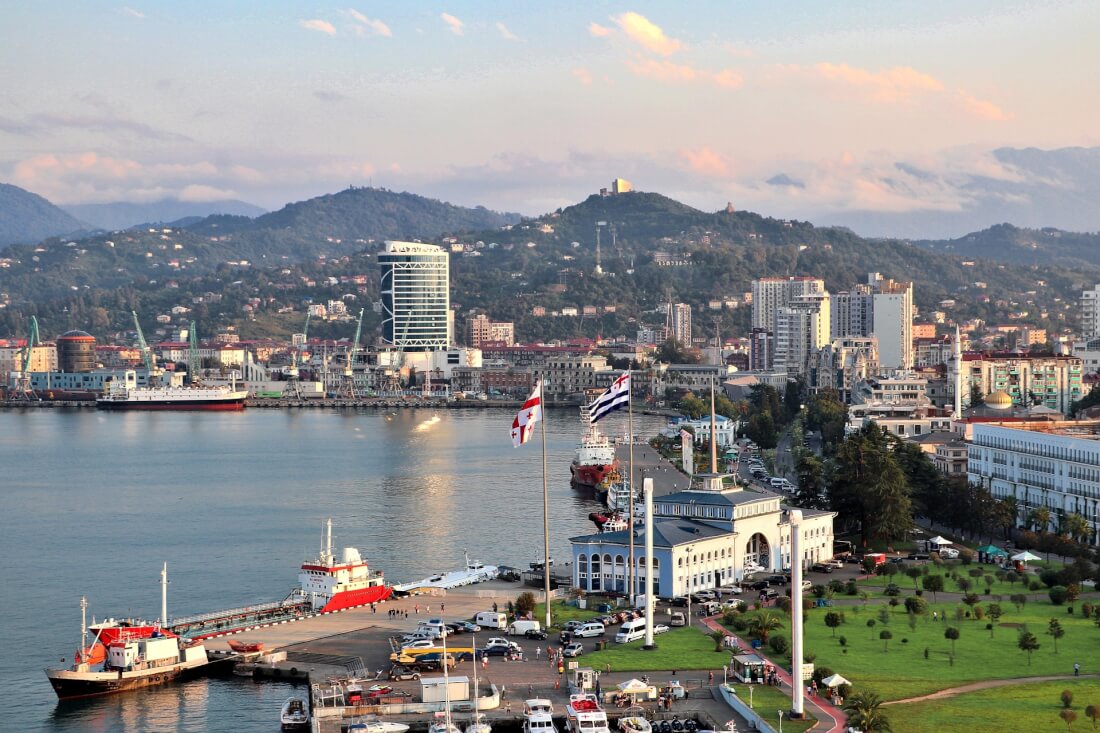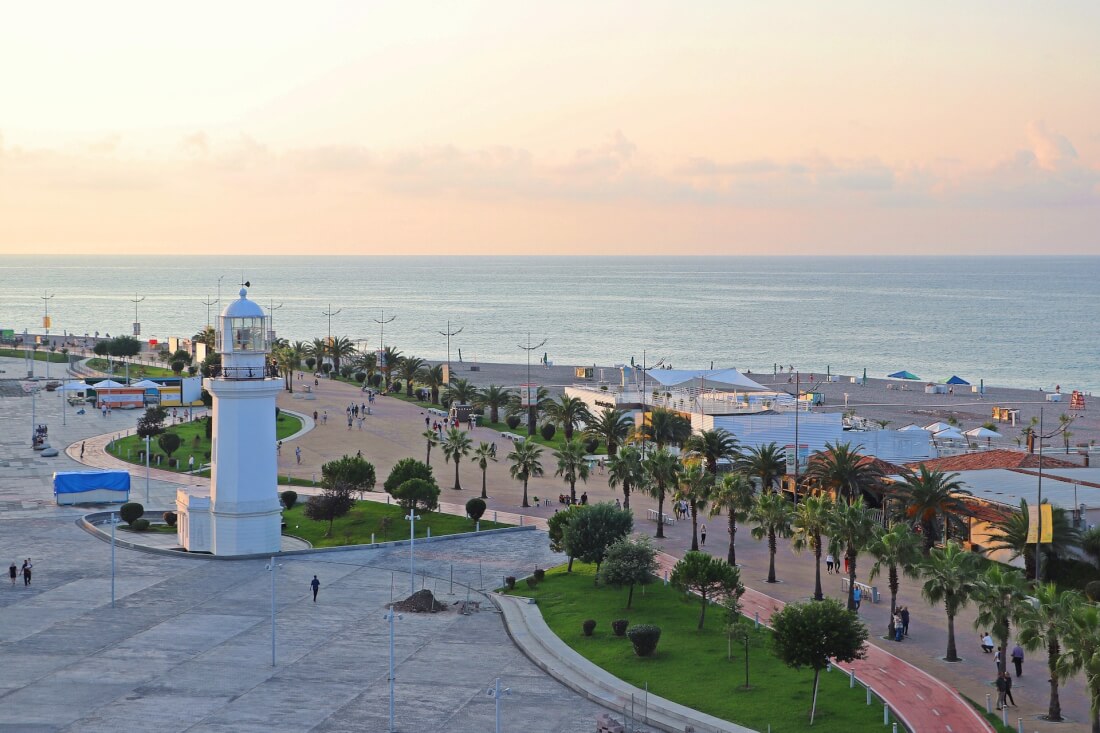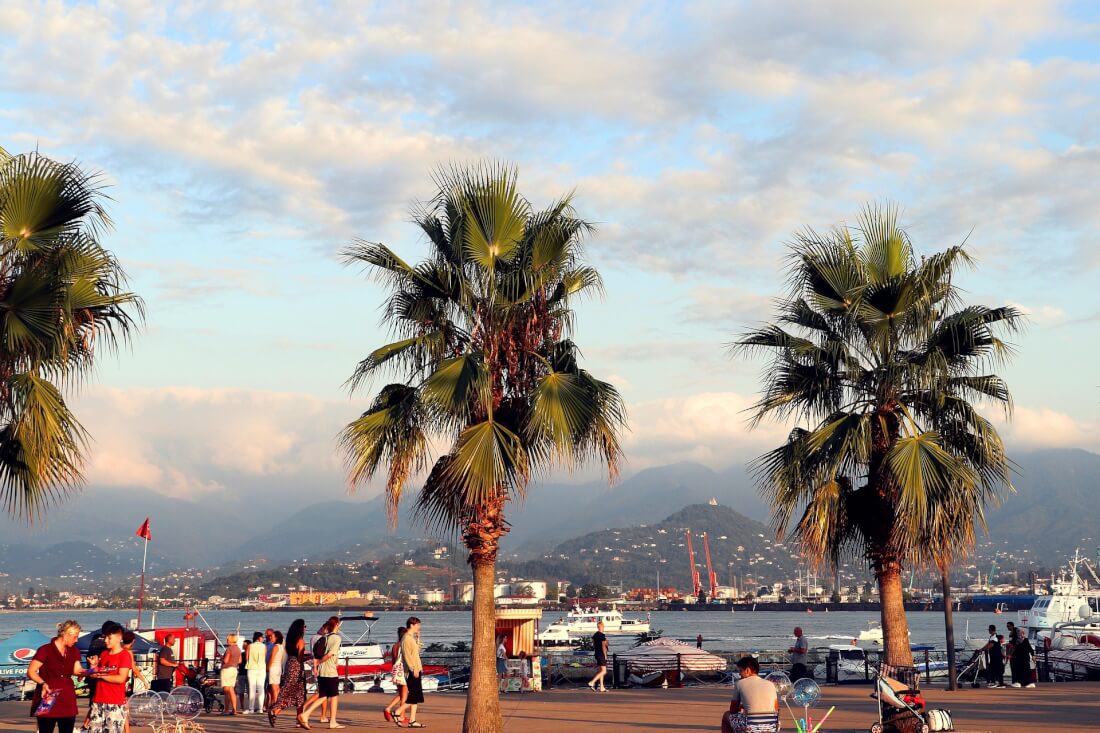Batumi's Seasons Explained

During the summer, the Batumi weather is at its most inviting for those seeking warmth and sun. Daytime highs often range between 23 and 26°C, with average lows around 17‑19°C at night. Sea temperatures are warm too, approximately 25°C, especially ...
Read more..
Autumn begins warm in September (daytime highs ~23°C), but by October temperatures tend to drop toward ~19‑20°C. Nights may cool further. Rainfall often increases sharply, especially in late autumn.
Sea temperatures in early autumn remain pleasa...

Winter in Batumi is mild yet very wet. Daytime highs hover around 10‑12 °C, while night lows can fall to ~4‑6 °C. Snow is rare in the city, and when it occurs, it’s often light. Rainfall is substantial in winter months with November among the wette...
Read more..
Spring and autumn touch the extremes. In spring, around April and May, daytime Batumi temperature rises from ~12‑13°C to about 19‑20°C. Nights are cooler. Rainfall reduces compared to winter but is not negligible. Nature is lush in spring, which wi...
Read more..Frequently Asked Questions (FAQs)
Batumi weather is generally mild and humid throughout the year due to its subtropical coastal climate. Summers (June to August) are warm and humid, with temperatures averaging 25 to 30°C (77 to 86°F). Winters (December to February) are cool and wet, with temperatures rarely dropping below 5°C (41°F). Spring and autumn are mild, featuring frequent rainfall and fluctuating temperatures. Rain is common year-round, especially in autumn. Snowfall is rare but possible in winter. The Black Sea moderates the climate, making extreme temperatures uncommon. Batumi is ideal for those who enjoy a lush, green environment supported by abundant rainfall and moderate seasonal changes.
The best time to visit Batumi for good weather is from late May to early October. During these months, the city enjoys warm temperatures, plenty of sunshine, and minimal rainfall, making it ideal for beach activities and sightseeing. July and August are the hottest months, perfect for swimming and enjoying the vibrant seaside atmosphere. Spring and early autumn offer milder weather and fewer crowds, making them great for exploring the city's parks and cultural sites. If you're planning a trip, be sure to check the Batumi weather forecast in advance to make the most of your visit.
Yes, Batumi is generally warmer than Tbilisi during the winter months but cooler in the summer. Located on the Black Sea coast, Batumi has a humid subtropical climate with mild winters and warm, humid summers. In contrast, Tbilisi, situated inland, experiences a more continental climate with colder winters and hotter, drier summers. Batumi weather is influenced by the sea, which helps moderate temperatures year-round. As a result, Batumi tends to have a more stable and comfortable climate, especially appealing during the winter when temperatures are milder compared to Tbilisi’s chilly conditions. Summer visitors may find Batumi more humid but less scorching.
The average summer temperature in Batumi ranges from 22°C to 27°C (72°F to 81°F), making it a pleasant destination for beachgoers and travellers seeking warm weather. July and August are the hottest months, with daytime highs occasionally reaching up to 30°C (86°F), though the humidity can make it feel warmer. Nights are generally mild and comfortable, perfect for enjoying the city's vibrant nightlife and seaside promenades. Batumi weather in summer is characterised by warm temperatures, frequent sunshine, and occasional rain showers due to its humid subtropical climate. These conditions make summer the most popular season for tourism in the region.
In July and August, Batumi hosts a number of lively festivals that highlight music, food, culture, and local traditions. The Black Sea Jazz Festival in July attracts international and Georgian musicians with jazz, soul, R&B, and more. Folk Days runs from the last weekend of July through August along Batumi Boulevard, showcasing traditional dance, music, and costumes. In mid‑August, the Black Sea Beer Fest takes place in Europe Square, a celebration of beer culture with live bands and food stalls. August also features the Honey Festival, offering local bee products and crafts, all enjoyed in warm Batumi weather.
Yes, Batumi can be quite crowded during the summer months, especially in July and August. This is peak tourist season, when both locals and international visitors flock to the city to enjoy its beaches, festivals, and vibrant nightlife. The pleasant Batumi temperature, typically ranging from 22°C to 27°C (72°F to 81°F), along with warm sea waters, makes it an ideal time for vacation. Popular areas like Batumi Boulevard, the beach promenade, and city attractions can get busy. If you prefer fewer crowds, consider visiting in late May, June, or early September when the weather is still nice but less hectic.
Yes, September is a great time to visit Batumi. The summer crowds begin to thin, but the city still enjoys warm weather and a lively atmosphere. The sea remains pleasant for swimming, and outdoor cafes and attractions are still in full swing. Batumi temperature in September typically ranges from 20°C to 25°C (68°F to 77°F), offering comfortable conditions for sightseeing, hiking, and beach activities. Rainfall is moderate, and the evenings are cooler, perfect for enjoying sunset walks along the boulevard. With a nice balance of good weather and fewer tourists, September offers an ideal blend of relaxation and exploration.
During autumn, Batumi offers a wonderful mix of activities as the weather cools but remains pleasant. Visitors can explore the vibrant Batumi Botanical Garden, where colourful foliage creates a stunning backdrop. Walking along Batumi Boulevard and the seaside promenade is especially enjoyable with mild Batumi temperatures averaging around 15°C to 20°C (59°F to 68°F). Autumn is also a great time to visit local wineries and taste Georgian wines during harvest season. Don’t miss cultural events and festivals celebrating the region’s heritage. Cosy cafes and restaurants invite you to savour traditional Georgian cuisine while enjoying the relaxed autumn atmosphere.
Yes, you can still swim in Batumi in September. The sea remains warm and inviting, with water temperatures usually around 23°C to 25°C (73°F to 77°F). Combined with a comfortable Batumi temperature ranging from 20°C to 25°C (68°F to 77°F), September is an excellent month for beach activities without the summer crowds. The weather is generally sunny and mild, making swimming and other water sports enjoyable. While occasional rain showers can occur, they rarely disrupt beach plans. Overall, September offers a perfect balance of warm sea and pleasant air temperatures for a relaxing seaside experience.
Snow in Batumi during winter is quite rare due to its humid subtropical climate. While temperatures can drop to around 5°C to 10°C (41°F to 50°F), heavy snowfall is uncommon. When snow does fall, it’s usually light and melts quickly because of the relatively mild Batumi weather influenced by the nearby Black Sea. Winters are generally wet and mild, with frequent rain rather than snow. If you’re seeking snowy landscapes, it’s better to visit Georgia’s mountainous regions. However, Batumi’s winter charm lies in its cosy atmosphere, lush greenery, and fewer tourists, making it a unique off-season destination.
Yes, Batumi is a great winter destination for budget travellers. With mild Batumi weather and fewer tourists, prices for accommodation and activities drop significantly compared to the busy summer months. You can find affordable lodging options, from budget guesthouses to reasonably priced hotels. Daily expenses for food, transportation, and sightseeing are generally lower, making it easier to enjoy the city on a budget. Although the weather is mild with occasional rain, it’s still pleasant for exploring Batumi’s cultural sites, parks, and seaside promenade. Overall, Batumi offers a cosy, affordable escape during the winter season.
In spring, Batumi Botanical Garden comes alive with a vibrant display of flowers, thanks to the region’s mild and favourable Batumi weather. One of the highlights is the rose garden, featuring 107 different cultivars, including tea hybrids, polyanthas, miniature, and climbing roses, which bloom from May through September. The garden is also famous for its Japanese camellias, which bloom twice a year in spring and autumn. Additionally, visitors can enjoy colourful blooms of ageratum, cleome spinosa, and amaranth. This rich diversity of flowers makes spring an ideal time to experience the natural beauty of Batumi Botanical Garden.
Both April and May are great months to visit Batumi, but May is generally considered better for pleasant outdoor activities. In April, Batumi weather is starting to warm up, with temperatures ranging from 12°C to 18°C (54°F to 64°F), but it can still be a bit rainy and cool. By May, temperatures rise to a more comfortable 16°C to 22°C (61°F to 72°F), and rainfall decreases, making it ideal for exploring the city, beaches, and botanical garden. May also brings blooming flowers and more sunshine, offering a livelier and more enjoyable experience overall.
Batumi offers a vibrant range of events and festivals in the fall, making it an ideal time to visit despite the cooler temperatures and occasional rain. One of the highlights is the Batumi International Art-House Film Festival (BIAFF) in October, featuring international films, masterclasses, and director meet-and-greets. In November, the TOFUZI International Animation Film Festival celebrates animation with screenings and workshops. Music lovers can enjoy Batumi MusicFest in late September, showcasing world-renowned performers. Additionally, the Gandagana Festival in early October highlights rural Adjarian culture with traditional dances, cooking, and local produce. These events, combined with mild Batumi weather, create a rich cultural experience.
During the winter months, Batumi offers a peaceful escape with fewer tourists and mild Batumi weather. Visitors can explore indoor attractions like the Batumi Aquarium. museums, and art galleries. The city’s cosy cafes and restaurants provide a warm atmosphere where you can enjoy traditional Georgian cuisine and wine. Outdoor activities include strolling along the scenic Batumi Boulevard, visiting the Botanical Garden with its evergreen landscapes, and exploring nearby mountainous areas for winter hiking. Although swimming is uncommon in winter, the city’s cultural events and festive holiday decorations make it a charming destination for a quiet winter getaway.


























